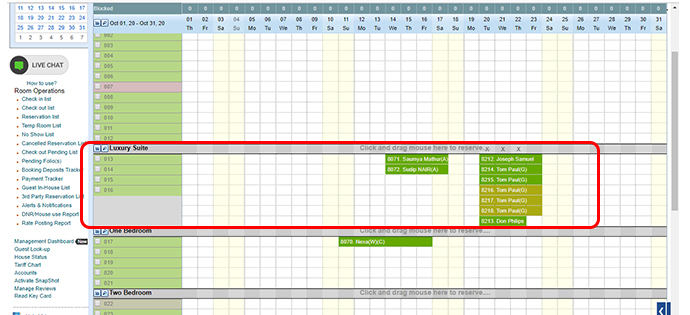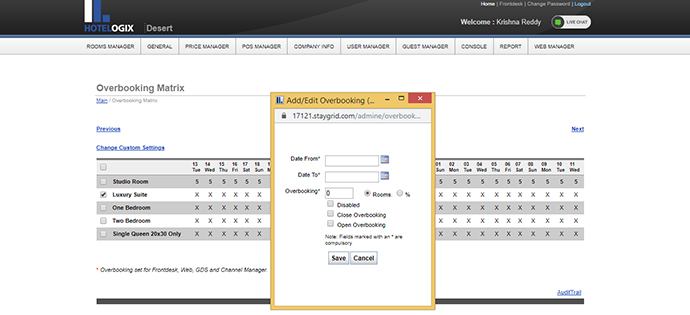Hoteliers across the globe are hugely impacted by the perishable nature of their rooms. No revenue can be realized from a room if it goes unsold for a given night. This phenomenon hurts a hotel’s occupancy and revenue. Hotels, today, are struggling to ensure higher or 100% occupancy due to several reasons. Because guests’ have enough options to select from and book their accommodation. This leads to instances like no-shows and booking cancellations.
To ensure full occupancy, hotels are trying their best to deal with no-shows and cancellations. And this is where overbooking strategy for hotels plays a major role. In their attempt to ensure that they don’t lose out on room revenue due to low occupancy, most of them are heavily banking on hotel overbooking solution.
So, what is overbooking in the hotel industry?
In the hotel industry, overbooking is a key revenue management strategy that helps maximize occupancy. It is the act of selling more rooms than are available in a hotel in a certain date range. Revenue managers implement overbooking practices in hotels by carefully calculating and anticipating a certain percentage of existing reservations that may get canceled.
Advantages of overbooking
Even though it is a part of the revenue management strategy, overbooking hotel rooms is purely related to room allocation and inventory management. This is mainly done to insulate hotels from revenue loss that may arise due to no-shows and last-minute reservation cancellations.
For example – you have 50 rooms in your hotel. During a peak season, due to high demand, you have sold all your 50 rooms. But you have noticed a trend of around 10% no-shows and cancellations during the same time last year. Considering the data that is available, if the same trend were to continue where you face no-shows or last-minute booking cancellations, you are looking at a guaranteed underbooking. And we all know, when business is in full swing due to peak season, underbooking is not the best thing that could happen to your property.
In such a case, to ensure that your property runs at 100% occupancy, you must look at adopting overbooking practices. You have already sold all your 50 rooms. You will still get booking inquiries due to the high season demand. You just need to have a careful and well-designed approach to sell a few more rooms. You can accept bookings for 5 more rooms because your historical data suggests that bookings for 5 rooms were canceled during the same time last year. Now, since you are selling 55 rooms against the actual room number of 50, this is called overbooking.
What happens here is that even if 5 guests don’t honor their reservations and they don’t show up, you still have 5 more bookings to fill in those rooms. You still have the number of additional reservations required to achieve 100% occupancy. This means you have protected yourself from revenue loss.
However, there is a catch
When cautiously approached, overbooking mitigates losses. But if implemented carelessly, it can lead to guest dissatisfaction, loss of revenue, loss of business opportunities, and you might jeopardize your property’s reputation. With a total available inventory of 50 rooms, accepting 5 more bookings against 5 anticipated cancellations is called ‘overbooking with caution’. But accepting 20 extra bookings against the same 5 expected cancellations can lead to a disaster.
How to go about overbooking hotel room
In order to determine how many rooms to overbook for a certain period of time, you must analyze
- Total number of rooms available to sell
- Confirmed reservations
- Guaranteed reservations – payments received in advance
- Expected no-shows based on historical data
- Expected last-minute cancellations based on historical data
- Expected bookings from walk-ins/OTAs and other channels
- Predicted overstays and understays
A careful examination of all these data points can help your revenue manager to determine how many rooms to overbook. It also helps you understand whether to implement the overbooking practice for the entire property – for all the 50 rooms or just for a particular segment of room.
The role of a Cloud-based Hotel PMS in implementing overbooking practices in hotels
Like in other hotel-related operations, a smart cloud-based Hotel PMS plays quite a crucial role in helping you implement a hotel overbooking strategy. You can leverage the power of new-age Cloud Hotel PMS, like Hotelogix, to locate and analyze your property’s historical/past data on no-shows, booking source-wise cancellations, last-minute cancellations, total room booked – both confirmed and guaranteed, your business on books, etc. Armed with the required insight on such valuable data, you will be able to know how many extra bookings to accept to overbook your property.
Now suppose, after a careful and diligent scrutiny, you arrive at the conclusion that accepting bookings for 5 more rooms against the total of 50 is what needs to be done to ensure a safe hotel overbooking strategy. In this case, with Hotelogix PMS in place, you can create virtual rooms to set overbooking either by percentage – 10% or by value – 5 rooms. This means the Hotel PMS would allow you to accept bookings for exactly 55 rooms and not more. Thus, it would help you prevent careless overbooking that is bad for your hotel business.


Not only this, but Hotelogix PMS also allows you to enable overbooking hotel room for the front office, website, and OTAs. You can choose to enable overbooking rule for all three channels at the same time, or you can select one of three channels. Plus, you can configure overbooking for the entire property (all the rooms) or any particular room type.



